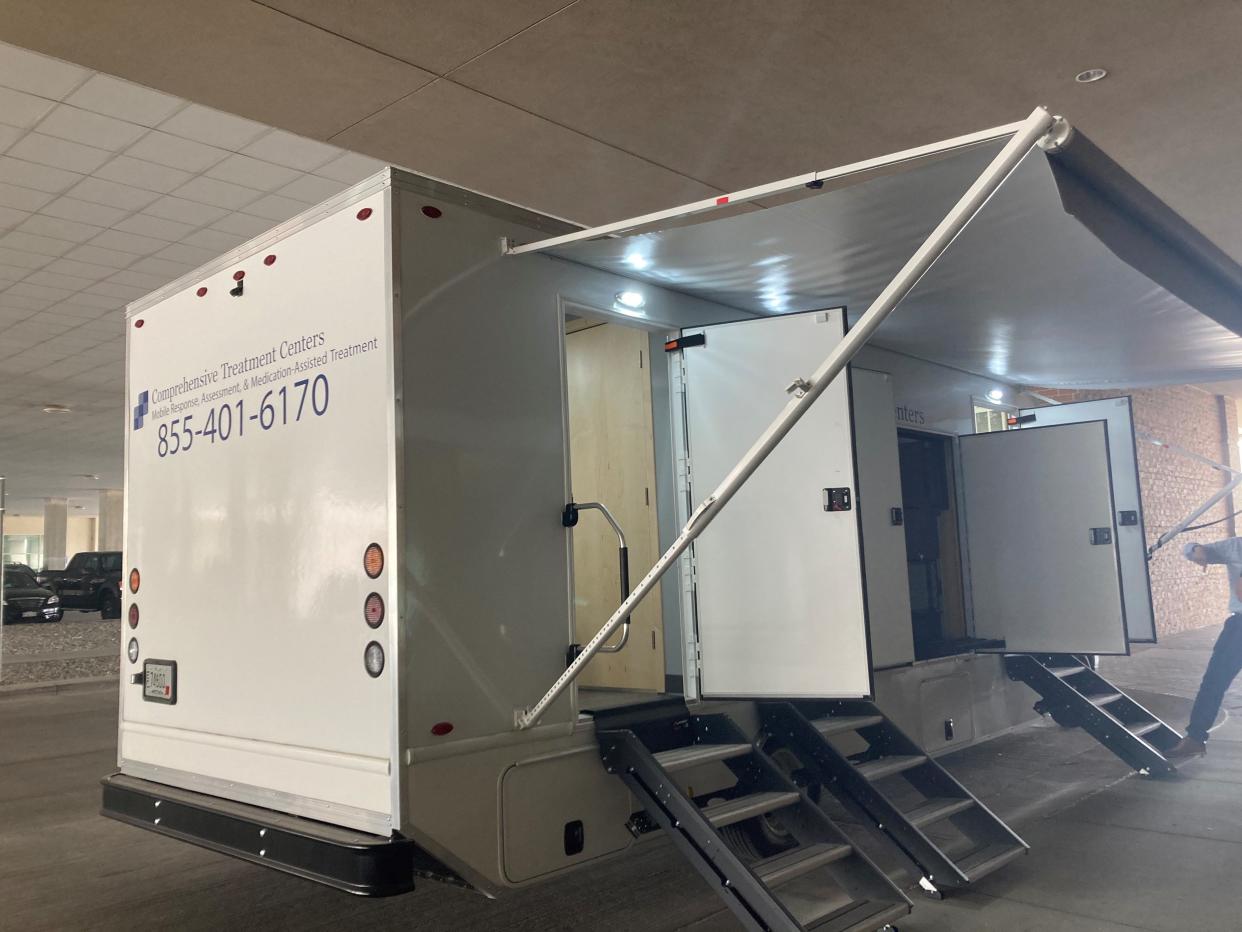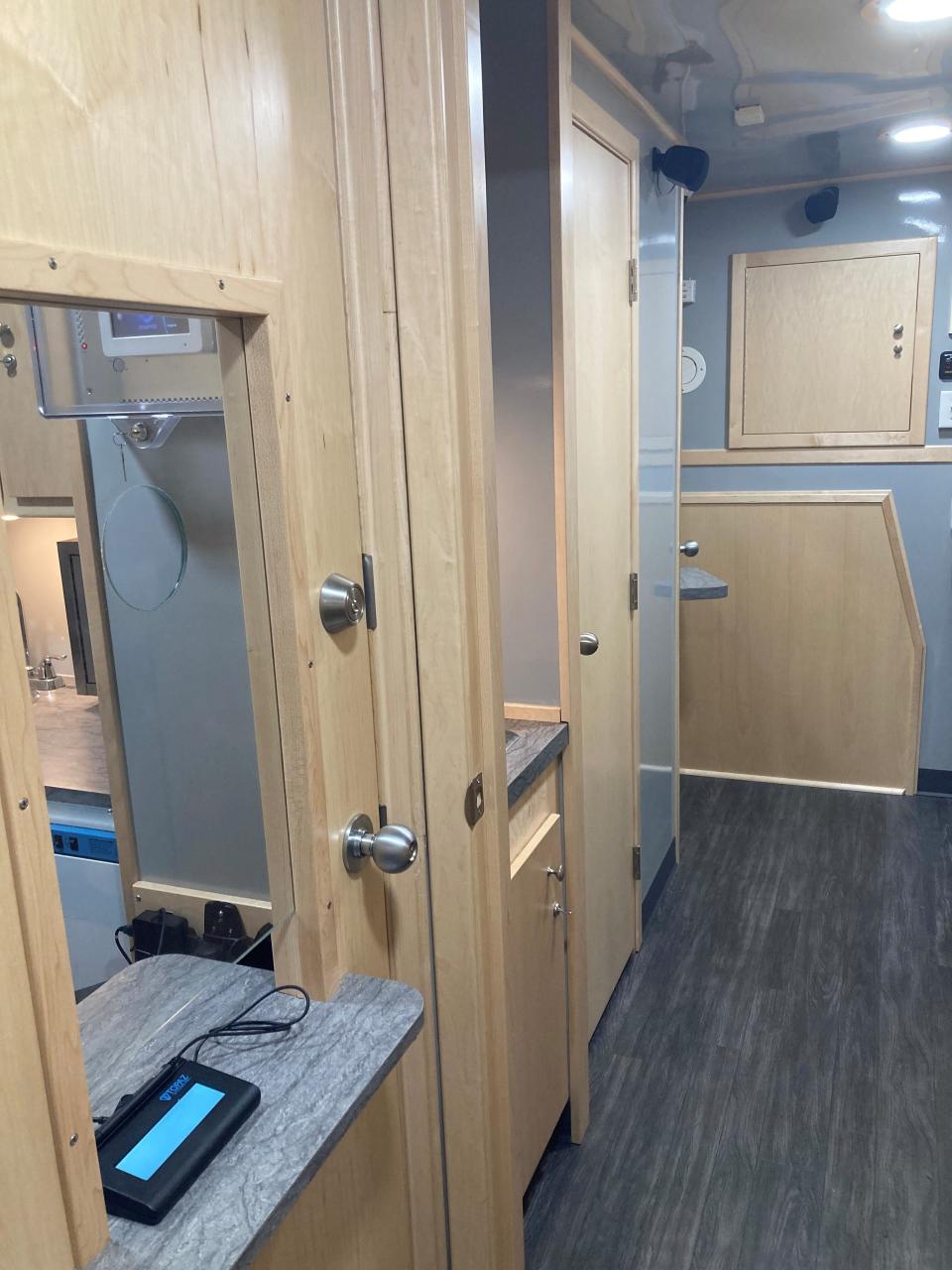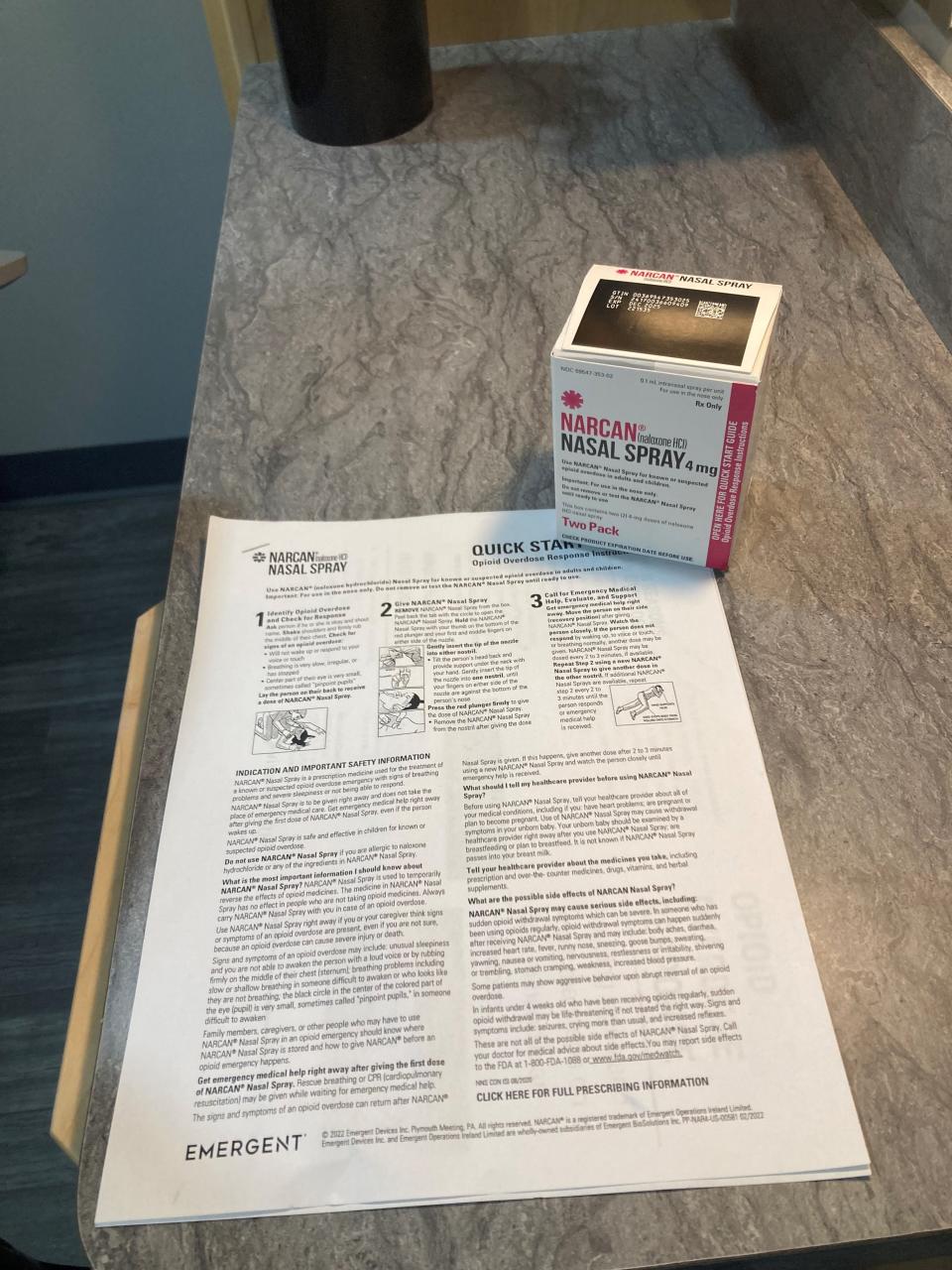Addiction treatment centers on wheels? Wisconsin aims to reach people in need of recovery where they are.

GREEN BAY - Imagine being able to drive entire opioid treatment programs to the most at-risk parts of Wisconsin.
Soon, the first of 13 mobile treatment centers will pull up to Kenosha to offer drug screenings, medication-assisted treatments and counseling for people struggling with addiction. The vehicles, armed with Narcan, fentanyl test strips, and three to five substance use specialists, will arrive over the course of the next few months in parts of the state that lack addiction treatment centers.
Years in the making, multiple Wisconsin providers, including Acadia Healthcare, Addiction Medical Solutions LLC, and Psychological Addiction Services, will deploy a total of 13 mobile opioid treatment programs, some vehicles with the capacity to treat 70 to 100 people per day at various stages of addiction recovery. That means Wisconsin is poised to have the most mobile treatment units in the country, according to Dan Bizjak, state opioid treatment authority at Wisconsin Department of Health Services, who spoke at the inaugural Wisconsin Harm Reduction Conference at the KI Convention Center Wednesday.
Here's what we know about these first-of-its-kind mobile opioid treatment programs.
Why are these opioid treatment programs coming now?
Access to treatment couldn't arrive at a more urgent time. The pandemic accelerated an opioid crisis already steeped in deaths, hospitalizations and stigma, according to DHS. So far, overdose rates haven't waned by much. Before the pandemic, suspected opioid overdoses averaged 519 incidents per month. That number jumped to 762 incidents per month at the start of the pandemic, a 47% increase, and has only seen a percentage change of 0.6% as COVID-19 cases declined.
In 2021, 1,427 Wisconsinites lost their lives to opioids, up 16% from 2020. That same year, opioid-related hospitalizations reached 3,133, the most severe year yet of emergency room visits.
"We just feel that the time is right, given the number of fatal overdoses we continue to see in the state," said Scott Stokes, communicable disease harm reduction section manager at Wisconsin Department of Health Services. "We need to take the next steps to do whatever we can to improve the health of people, or at least, hopefully, we can help them get into some kind of treatment services."

How were the locations determined?
Bizjak told the audience at one of the Harm Reduction breakout sessions he was "astonished" when he learned how far the nearly 13,000 people accessing addiction treatment traveled to maintain sobriety in 2021.
Patients from the 22 opioid treatment programs in Wisconsin drove as far as two hours sometimes to access medication-assisted treatment, Bizjak said. And, based on the 2021 Report on Opioid Treatment Programs in Wisconsin, those patients traveled an average of more than 33 miles for services.
"More and more folks are driving longer distances to come to the programs," Bizjak said.
In 2022, DHS awarded six $500,000 contracts to expand opioid treatment program services to areas of the state that lacked nearby treatment facilities. It prioritized cities across 10 counties: Kenosha, La Crosse, Monroe, Marinette, Manitowoc, Columbia, Rock, Jackson, Walworth and Shawano.
It's currently open to contracting two more $500,000 units with any addiction facility provider certified with DHS 75.50 and DHS 75.59, Bizjak said.
When Sarah Neerdaels-Smalls, regional director at Green Bay Comprehensive Treatment Center, part of Acadia Healthcare, was looking at possible locations for a future mobile opioid treatment program, she realized a big cluster of patients were from Marinette, about an hour's drive.
At other Acadia Healthcare clinics across Wisconsin, Neerdaels-Smalls found this wasn't just unique to Green Bay. Through three grants from the State Opioid Response (SOR) program and three from the federal multistate opioid settlement, Acadia Healthcare secured funding for mobile opioid treatment programs in Marinette, Shawano, Elkhorn, Kenosha and Manitowoc.
"We noticed a lot of people are traveling at least 45 minutes to another part of the state," Neerdaels-Small said. "You should not have to drive an hour here and an hour home every single day. They shouldn't be tied to the road so much. That's a huge thing for somebody trying to manage their recovery."
What's inside the mobile unit?
The mobile opioid treatment program has all the trappings of any addiction treatment facility. There's an electronic kiosk for patients to input their patient ID number, which will note what they're due for that day, whether it's a drug screen, counseling session or bloodwork. Yes, the mobile unit has a diagnostic lab, too, where patients can get HIV, HCV and STI testing.
Upon stepping into the unit, a registered nurse operates the reception desk. Their role is to check patients in, test urine samples, and dispense any of the three FDA-approved addiction medications – methadone, suboxone or vivitrol, the latter of which is an injection administered by a nurse in a private room.

The nurse also measures a patient's withdrawal symptoms through a tool called clinical opioid withdrawal scale or COWS, in order to determine dosage of the medication-assisted treatment.
All mobile opioid treatment programs come stocked with Narcan, the emergency medication used to reverse and mitigate the effects of opioids.
Importantly, patients who use the mobile opioid treatment program can meet with specially trained counselors. Counselors will also respond to phone calls associated with the provider's private telehealth number.
"The medication takes away those physical and mental withdrawals … but that's only one piece of it. A good MAT (medication-assisted treatment) program incorporates counseling," Neerdaels-Smalls said. "That's talking about the behavioral health issue, helping them build a treatment plan and goals. How do we get to where you need to be? That is just as important, if not more important."
When will patients be able to access the mobile clinics?
It took about nine months to license the mobile opioid treatment program deploying to Kenosha, Neerdaels-Smalls said. That timeline allows mobile clinics to undergo licensing by the Wisconsin Division of Quality Services (DQA) and then get certified and approved by the Drug Enforcement Administration (DEA).
Neerdaels-Smalls said the Kenosha mobile opioid treatment program will be open to the public once the clinic obtains the certification from the DEA, which could happen as soon as the next couple of weeks. Clinics associated with Acadia intend to inform their patients of the new mobile program.
As for the Marinette mobile clinic, Neerdaels-Smalls said that, in the next 60 days, it will roll out from the Green Bay Green Bay Comprehensive Treatment Center at 5 a.m. every morning and be available for Marinette patients from 6 to 9 a.m.
Neerdaels-Smalls said she's letting all her patients know about the new Marinette mobile clinic. Additionally, she and other staff will be hitting the streets and spreading the word through community resources.
Is the mobile clinic free?
The opioid treatment program is not free, but it accepts Medicaid, Medicare, self-pay and most commercial insurances, Neerdaels-Smalls said.
That said, 211 is the 24/7 confidential warmline associated with addiction recovery support in Wisconsin, said DHS Director of Opioid Initiatives Paul Krupski. There's also a chat option on the website at 211 Wisconsin (communityos.org) and a texting option, too, where you can text your ZIP code to 898211.
"The great part about this helpline, which we launched several years ago now, is that you're going to get connected to services that are local to you," Krupski said. "We need to make sure that we are connecting them to the services they need."
Natalie Eilbert covers mental health issues for USA TODAY NETWORK-Wisconsin. She welcomes story tips and feedback. You can reach her at neilbert@gannett.com or view her Twitter profile at @natalie_eilbert. If you or someone you know is dealing with suicidal thoughts, call the National Suicide Prevention Lifeline at 988 or text "Hopeline" to the National Crisis Text Line at 741-741.
Our subscribers make this coverage possible. Click here to subscribe to a USA TODAY NETWORK-Wisconsin site today and support local journalism.
This article originally appeared on Green Bay Press-Gazette: 13 mobile opioid treatment programs are coming to Wisconsin. Here's what we know.

